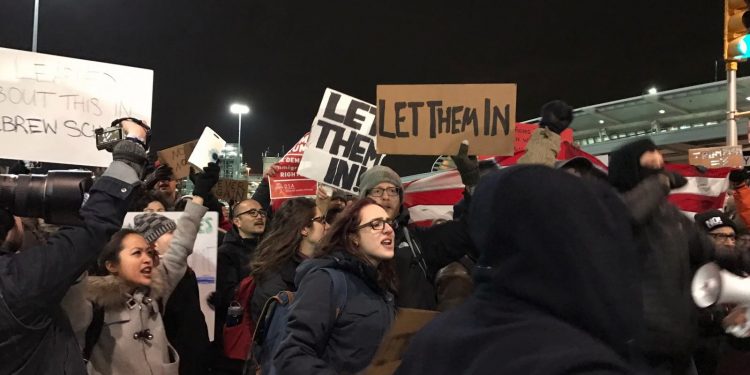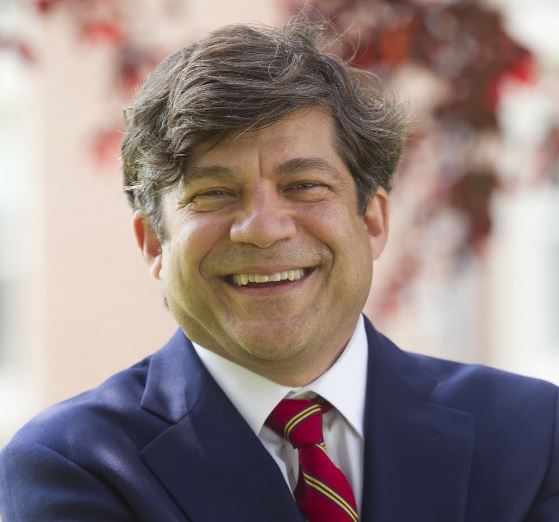How the Courts Could See Their Way to Striking Down the Trump Travel Ban
The Trump executive order banning nationals of seven Muslim states and suspending refugee admissions is, as a matter of policy, monumentally stupid. It is malevolence tempered only by incompetence, as Ben Wittes puts it. That may ultimately prove its constitutional undoing, but the result is hardly foreordained. Beyond this weekend’s initial skirmishes, legal challenges to the order face an uphill battle.

The Trump executive order banning nationals of seven Muslim states and suspending refugee admissions is, as a matter of policy, monumentally stupid. It is malevolence tempered only by incompetence, as Ben Wittes puts it. That may ultimately prove its constitutional undoing, but the result is hardly foreordained. Beyond this weekend’s initial skirmishes, legal challenges to the order face an uphill battle. The courts have never imposed meaningful constraints on the executive branch in this context. That does not mean they couldn’t or that they won’t here.
A Supreme Court opinion upholding the order would practically write itself. The precedents are full of broad pronouncements highlighting the exceptional place of immigration law in the constitutional canon. Plenary power is no myth. Adam Cox and Jack Chin try to peg the cases to the retrograde constitutional contexts in which the cases were handed down, but they were not simply a reflection of their times. The 1977 decision in Fiallo v. Bell—well into the modern-era rights revolution—is particularly instructive. The case involved a facially discriminatory provision of the Immigration Act that recognized the relationship between children born out of wedlock with their mothers but not their fathers. The regime implicated a double-barreled discrimination for equal protection purposes, implicating the suspect classes of gender and legitimacy. The Court upheld the provision on the basis of exactly the kinds of stereotypes that trigger close judicial scrutiny in any other context. “In the exercise of its broad power over immigration and naturalization,” wrote the Court, “Congress regularly makes rules that would be unacceptable if applied to citizens.”
The Court deferred to the legislative scheme even though it involved no plausible national security interests. At the intersection of immigration and national security, the Court has validated harsh results. In Shaughnessy v. United States ex rel. Mezei, the Court upheld the exclusion of a returning permanent resident of 25 years, standing on the basis of secret evidence, even though the exclusion posed the prospect of indefinite detention on Ellis Island (no other country was willing to “take him off our timorous hands,” as Justice Jackson observed in dissent). Mezei was afforded no process: “Whatever the procedure authorized by Congress is, it is due process as far as an alien denied entry is concerned.” In Harisiades v. Shaughnessy, the Court upheld the deportation of long-time permanent resident on the basis of former membership in the Communist Party, even where it was clear that the membership was casual or the attachment to communist ideology had long been abandoned.
It is true that these were Cold War cases, decided in a historical context in which the Supreme Court could hardly afford to spend down institutional capital in the face of other controversial agendas (domestic civil rights among them). But as recently as 2015, the Court in Kerry v. Din upheld the denial of an immigrant visa to the spouse of a US citizen on unspecified terrorist-related grounds, an important interest denied with no meaningful process. The Supreme Court has never struck down a provision of the immigration law outright. This line of cases, now stretching back more than a century, adds up to the plenary power doctrine.
But just because it hasn’t happened in the past doesn’t mean it can’t happen in the future. There are unprecedented facets of the travel ban and its context that could embolden the courts to push back in novel ways.
The atmospherics are consequential. First is the spectacularly sloppy way in which the ban was adopted. There isn’t even the pretense of the order having been properly vetted within the executive branch. That will offend judicial sensibilities—already evidenced by the district court orders over the weekend—which start with procedural regularity. Although that won’t show up in any opinions, judges will approach the order with skepticism rather than obeisance.
Second, and relatedly, is the fact that the order serves no counterterror purpose. Refugees are the most vetted of immigrants—no terrorist would take the refugee route into the United States, and in fact none have (leaving aside the minor exception of two Iraqi refugees who faced terrorism charges in 2011 for conduct that occurred prior to entering the US). Not a single terrorist attack has been undertaken in the United States by any national of the seven listed countries. On the contrary, the travel ban will undermine national security interests by further alienating the Islamic world. Many experts have testified to this fact and there don’t appear to be any credible experts who support the ban. The State Department dissent memo received an unprecedented number of signatures, reportedly a thousand.
Why is this important for purposes of judicial scrutiny? It could help shift the courts away from their historically cautious approach to anything implicating national security values. That is at the heart of jurisdictional barriers to considering foreign relations controversies, which is in turn at the heart of plenary power. Judges fret that they have an incomplete understanding of foreign relations. What’s more, if they get it wrong, they see a dramatic downside risk. Judges are unlikely to have that feeling here. Any educated observer can see the folly of Trump’s move. They won’t worry about getting it wrong, or about a downside risk, at least not as a matter of national security.
This element can be plugged into the doctrinal analysis. Even the plenary power cases allow for some level of judicial scrutiny. The Supreme Court has set the bar pretty low. Is the measure “a fantasy or pretense” (Harisiades)? Is it “facially legitimate and bona fide” (Kleindienst v. Mandel)? Well, in this case, maybe not. The courts could find the travel ban lacking even under these extremely deferential standards. Other cases supply more favorable language. In the 2001 decision in Zadvydas v. Davis, the Court found the immigration power “subject to important constitutional limitations” on the way to interpreting the Immigration Act to bar the indefinite detention of deportees whose home countries refused to accept repatriation. A case unrelated to the travel ban now before the Court addressing a gender-discriminatory element of the nationality law could add to the quiver (the Justices will surely understand the broader implications of their ruling in Lynch v. Morales-Santana). The courts might also squeeze a non-discrimination provision of the immigration act (not really intended for these purposes) to roll back the ban, as David Bier credibly argues here.
Finally, there are the crowds. An op-ed I wrote for the New York Times in December 2015, back when both a Trump presidency and the possibility of a Muslim ban seemed blissfully hypothetical, has mostly been cited for rehearsing the doctrinal edifice of plenary power. But I tried to end on a more hopeful note—that the courts often follow the People in announcing constitutional norms. I didn’t quite believe at the time I wrote this that the broader public actually would demand more searching scrutiny of immigration law. I do now. The fact of visible, spontaneous demonstrations against the executive order—coupled with broad opposition among elites—could help show the courts the way to pivot away from plenary power. It will take less courage and institutional fortitude.
So, I am cautiously optimistic that the courts will stand up to Trump and his ill-considered travel ban. The analogy here—in terms of atmospherics, not doctrine—are the Guantanamo cases from the 2000s. No one would have expected the Court to push back in the face of overwhelmingly deferential precedents implicating military hostilities. But by the time the cases reached the Court, the Bush Administration has lost a great deal of credibility, and the circumstances were such that the Court could feel confident that demanding some process for Guantanamo detainees would not cross counterterror purposes. How those decisions have translated on the ground is a question for debate, and there would be similar complexities to reversing the Trump order. But the courts should start putting the Constitution to work in the immigration context as in others.



.png?sfvrsn=48e6afb0_5)

